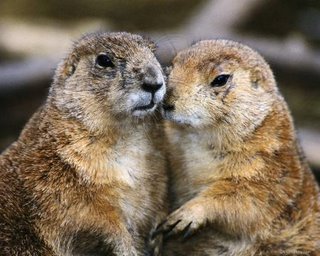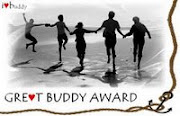
A nice piece I found in some old papers today while looking for something else. This article appeared in SUNSTONE, August, 1990. It's written by an old acquaintence, Levi S. Peterson, and was presented at the 1990 Washington D.C. Symposium.
A MORMON EVOLUTIONIST AND THE WILD GOD'S GRACE
(excerpts)
...Prairie dogs are rodents which live in burrows. In prehistoric America their subterranean dwellings covered hundreds of miles of grassy plains. Viewing them, I thought of the birds to whom St. Francis of Assisi preached, for these prairie dogs seemed like a congregation of worshipers--curious, attentive, and devout. I join St. Francis in declaring the plants and animals of the earth to be my closest brothers and sisters. I rely on my mute intuitions to inform me that the impulse to to live I find everywhere on this fecund earth, in grasses and algae and pine trees as well as in prairie dogs and human beings is godly. This inorganic planet of magma, rock, water and air, is divine; but even more divine is the life that has occupied it and made it home. I love the wild world because it is so replete with an unapologetic impulse to live. The plants and animals claim their birthright. They do not agonize over duty; they listen to an inner commandment and strive to exist. And in their presence I worship, for God has spoken them, and they are his Word.
...I do not limit culpability among animals to the carnivores, for herbivores are guilty of maiming and killing plant life. For that matter, plants too participate in evil as they ingest, inhibit, and kill other plants or animals. It is the inborn curse of the mortal order whereby all living things are under the grim necessity of devouring other life. To achieve the goodness of developing my own life and the lives of other human beings and the lives of the plants and animals I choose to favor, I must sacrifice innumerable other plants and animals.
...I do not try to clear God of complicity in this tragic state of affairs. It was God who ordained that the original protoplasm from which life has evolved should be mortal. So on Judgement Day, if there is to be a Judgement Day, God will stand indicted under a law of his own devising. On that day I will be ready to forgive God, as I hope he will forgive me. I will forgive him because I do not believe he can intervene in the natural order he has established. My only certitude regarding God is this: he is the creative force of the cosmos which expresses itself in natural law. But of course, I am pleased to imagine, to hope, he is much more as well. I hope God is the guarantor of certain outrageous miracles, one of which is the immortality of individual human beings...I hope he is the supernatural destiny toward which consciousness and spirit in the natural world are tending.
...Each Sunday as I partake of the sacrament, I devote a portion of my meditation to a prayer for pardon. I do not ask Christ to forgive me, because I do not believe he has ever condemned me...I must forgive myself, over and over for failing to be a saint. I affirm that the best and purest expression of God in this wide universe is in the imperative of the human conscience toward self-sacrifice in behalf of others. "If any man will come after me," said Jesus, "let him deny himself, and take up his cross, and follow me...." The cross of our new ecologically oriented age is vaster, weightier, more hopeless of being borne than the old cross of earlier ages. We are asked to be eco-saints. Though our duty to our own kind is in nothing diminished, we are now asked to love and cherish the wild world as well. We are asked to covenant ourselves to the cause of clean air, pure water, and natural soil. We are asked to engage ourselves in behalf of snails, meadowlarks, kelp, moths, and earthworms, too. The living world is our temple and we are asked to keep it holy."
(It's LONG but it's worth it.)















6 comments:
uh! Silly Blogger went and ate my pretty little comment! I'll go see if I can reconstruct.
Hi, k!
Hi! Lucky me, I found a copy!
Interesting perspective re. this: that it's somehow wrong or immoral to consume that other life in maintaining our own.
While I empathize with the sentiment, I completely disagree. Life consuming other life as food is an integral and unavoidable part of life itself; how could it possibly be wrong?
Neighbor Peter - giver of *Pilgrim at Tinker Creek* - finds this almost unbearable. Recently he asked me, --How could a loving God create a world where we must kill plants and animals in order to live?
I have no problem with that, myself. I take it as it is. To want to try to change the natural order of things - at least, at this basic level - tells me more about the speaker's control issues than about compassion.
I think that Levi takes both views. As I do, I think. I find it almost unbearable (every other day I decide to become a vegetarian=assuming that plants are not sentient as animals are- and then find myself enjoying a chili-dog in spite of it). I try not to think too much about it, because, like Levi, I also think that the natural order of things is what it is.
Most certainly not immoral, but somehow sad....
I read a piece somewhere, several years back, about a study on plants' communications when they were pulled for harvest. According to this study - they screamed.
Other recent works have shown that trees, for example, have a measurable chemical communication system that spikes up high when, say, a giraffe starts eating their leaves. Other nearby trees then do things like alter the chemical composition of their exhalations to include things that giraffes dislike.
Talking to each other to avert the danger of being eaten.
When I was a child I really wrestled with that life cycle thing. So to act like it never bothered me is not accurate.
And from my *older* person's perspective today, I feel the loss of death still, even when I see how clearly it's part of that circle of life. Loss is sad, a turning point, a change; I do feel all those things.
But Levi used it in a moral context, as "right/wrong," as something to apply *forgiveness* toward. That surprised me.
Peter spends a lot of time chasing blue jays away from our lizards. It greatly distresses him that birds eat lizards. I think he'd be healthier about it emotionally if he could accept it as part of how things not only ARE, but SHOULD be.
I have to remember not to let his sadness make ME sad!, that's all.
Post a Comment